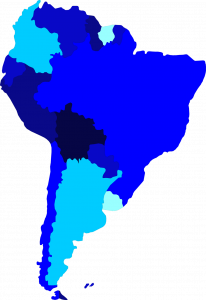Navigating Legal and Regulatory Frameworks When Nearshoring Development to Latin America
Table of Contents
As Nearshoring to Latin America becomes an increasingly popular choice for American companies looking to reduce costs while maintaining quality, navigating the legal and regulatory frameworks of the region has become a critical consideration.
Table of Contents
In this blog, we’ll take a closer look at the key legal and regulatory considerations when Nearshoring development to Latin America.
1. Intellectual Property Protection
One of the most important legal considerations when Nearshoring development to Latin America is intellectual property protection. American companies need to ensure that their intellectual property is protected when working with a near-shore development team. Here are a few key steps that companies can take to protect their intellectual property:
1.1 Use Contracts with Clear Intellectual Property Provisions:
When working with a near-shore development team, it’s important to use contracts that clearly define intellectual property ownership and rights. These contracts should include provisions for confidentiality, ownership of software, and the scope of use of intellectual property.
1.2 Register Intellectual Property in the United States and in Latin America:
To ensure maximum protection of intellectual property, companies should register their patents, trademarks, and copyrights in both the United States and in the countries where their near-shore partners are located.
1.3 Implement Appropriate Security Measures:
It’s important to implement appropriate security measures to protect intellectual property from theft or misuse. This may include limiting access to sensitive information, using secure communication channels, and implementing data encryption.
2. Labor and Employment Laws
Another important legal consideration when Nearshoring development to Latin America is compliance with labor and employment laws. American companies need to ensure that they are complying with the laws and regulations of the countries where their near-shore partners are located. Here are a few key labor and employment laws to keep in mind:
2.1 Minimum Wage and Overtime Laws:
American companies need to ensure that they are complying with the minimum wage and overtime laws of the countries where their near-shore partners are located. This may include paying overtime rates for hours worked beyond a certain threshold and complying with minimum wage requirements.
2.2 Employment Contracts and Termination:
Employment contracts should be used to define the terms and conditions of employment, including compensation, benefits, and termination. Termination laws and procedures vary by country, so it’s important to ensure that these are properly documented and understood.
2.3 Employee Benefits and Taxes:
American companies need to ensure that they are complying with the employee benefits and tax laws of the countries where their near-shore partners are located. This may include paying payroll taxes and providing benefits such as health insurance, retirement plans, and paid time off.
3. Data Protection and Privacy Laws
Data protection and privacy laws are also an important consideration when Nearshoring development to Latin America. American companies need to ensure that they are complying with the data protection and privacy laws of the countries where their near-shore partners are located. Here are a few key data protection and privacy laws to keep in mind:
3.1 Data Privacy Regulations:
Many countries in Latin America have their own data privacy regulations, such as the General Data Protection Regulation (GDPR) in the European Union. American companies need to ensure that they are complying with these regulations when working with near-shore partners.
3.2 Data Transfer Agreements:
Data transfer agreements should be used to define the terms and conditions of data transfer between the American company and the near-shore partner. These agreements should include provisions for data protection, confidentiality, and data breach notification.
3.3 Data Encryption and Security Measures:
American companies need to ensure that appropriate data encryption and security measures are in place to protect sensitive information from theft or misuse. This may include using secure communication channels, implementing data encryption, and limiting access to sensitive information.
4. Navigating Legal and Regulatory Frameworks: Tips for Success
Navigating the legal and regulatory frameworks when Nearshoring development to Latin America can be challenging, but there are several key steps that American companies can take to ensure success. Here are a few tips for success:
4.1 Work with a Reputable Near-Shore Partner:
Working with a reputable near-shore partner with a strong track record of success can help to mitigate legal and regulatory risks. These partners should have a clear understanding of the legal and regulatory frameworks in their countries and be able to provide guidance and support to their American partners.
4.2 Engage Legal and Regulatory Experts:
Engaging legal and regulatory experts who are familiar with the countries where the near-shore partner is located can help American companies navigate the legal and regulatory frameworks more effectively. These experts can provide guidance on compliance and risk management.
4.3 Use Clear Contracts and Agreements:
Using clear contracts and agreements with clear intellectual property provisions, employment terms, and data protection measures can help to mitigate legal and regulatory risks.
4.4 Regularly Monitor Compliance:
Regularly monitoring compliance with labor and employment laws, data protection and privacy laws, and intellectual property protection measures can help American companies identify and address any issues before they become major problems.
Table 1: Comparison of Key Legal and Regulatory Frameworks by Country in Latin America
| Country | Intellectual Property Protection | Labor and Employment Laws | Data Protection and Privacy Laws |
| Brazil | Good | Complex | Good |
| Mexico | Good | Strict | Good |
| Argentina | Fair | Complex | Good |
| Colombia | Fair | Complex | Good |
| Peru | Good | Complex | Good |
| Chile | Good | Strict | Good |
(Source: Tholons Digital Innovation Report 2021)
Table 2: Key Considerations for Intellectual Property Protection When Nearshoring to Latin America
| Consideration | Description |
| Clear Contracts | Use contracts that clearly define intellectual property ownership and rights, including provisions for confidentiality, ownership of software, and the scope of use of the intellectual property. |
| Register Intellectual Property | Register patents, trademarks, and copyrights in both the United States and in the countries where the near-shore partners are located. |
| Security Measures | Implement appropriate security measures to protect intellectual property from theft or misuse, such as limiting access to sensitive information, using secure communication channels, and implementing data encryption. |
(Source: Global Delivery Locations: Comparative Costs Report 2021)
Visit our exclusive page on Hiring Nearshore Developers to learn more about finding the ideal LatAm talent for your business.
If you’re looking to hire LatAm developers remotely, take a look at our guide on the Top 7 Websites to Hire LATAM Developers in the Americas for more in-depth information.
5. Conclusion
As Nearshoring to Latin America continues to grow in popularity, navigating the legal and regulatory frameworks of the region has become a critical consideration for American companies. Intellectual property protection, compliance with labor and employment laws, and data protection and privacy laws are all important legal considerations when Nearshoring development to Latin America. By working with reputable near-shore partners, engaging legal and regulatory experts, using clear contracts and agreements, and regularly monitoring compliance, American companies can successfully navigate the legal and regulatory frameworks of the region and maximize the benefits of Nearshoring development to Latin America.



